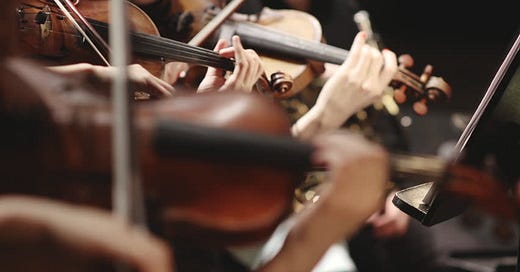Last summer I sent out an essay to my mailing list about my dislike of the concerto as a musical form (and my particular disdain for Tchaikovsky’s Rococo Variations). At the time, my mailing list was much smaller and it was via the no longer existing site TinyLetter (RIP). The essay isn’t archived anywhere, and since there are so many new subscribers to my newsletter (hi! thank you for supporting my work!) I figured I’d enshrine it here on Substack.
But first!
I’ll be performing at Merkin Hall in NYC on May 2nd joined by Time For Three’s Charles Yang (violin) and From The Top’s Peter Dugan (piano). These guys are an absolute powerhouse duo who agreed to join me for this and I’m very honored. The show will be a mix of comedy and music, which is cool because those are the two things I happen to do! (Which do I like better, you might ask? That’s a tough question for me — because the answer is most certainly comedy and I don’t want to offend any musicians). Speaking of music, here’s the aforementioned essay:
I'm done with the Concerto
As I woke up the other morning to a classical music station on my clock radio, I was subjected to a piece that’s unfortunately all too familiar: Tchaikovsky’s Rococo Variations — a piece for solo cello and orchestra (for non-music people, a Concerto is *loosely* a piece for a solo instrument accompanied by an orchestra). I don’t know who was playing, but whoever was holding it down on the cello sounded great by my snobby Juilliard-graduate standards (did I mention I went to Juilliard??), and whatever orchestra accompanied was appropriately terrified to play anything above a mezzo piano. Having supported many soloists during my years playing in orchestras, I know that in order not to overpower the solo violinist or pianist or God forbid the solo double bassist or marimba player (seriously, what are we doing here people??) the orchestra — usually comprised of about one hundred musicians — needs to basically fake play. But my question is, why?
Not why must we play so quietly? (reason stated above) but, why must we continue subjecting the world to concerti all together? Sure, there are some pieces I’m deeply moved by that happen to be concerti (the Barber Violin Concerto, and…well, maybe just that one) but to move people by performing breathtaking compositions — whether or not a piece is “breathtaking” is subjective, I know, but like, I fucking hate the Rococo Variations and so do you, don’t lie — is not why we program most music. Nay, most music gets played to fill some sort of quota, and concertos (I’m going to stop using the plural concerti now because lol) get programmed to give opportunities to specific players who our little classical music world has deemed stars.
Now, in the educational setting, i.e. conservatories, I have a bit more understanding. After all, concertos are often technically demanding of the soloist, so studying the ones written for your particular instrument can be a beneficial exercise. And holding concerto competitions — like where all the violists in the school compete to see who gets to perform Der Schwanendreher as soloist with the school’s orchestra — gives students a lovely introduction to measuring one’s self-worth based on how you measure up to others. Fuck it, I’m down. Anything to make me feel something.
But in the professional world, I’m done with concertos. They’re often inferior compositions to a composer’s non-soloist-driven works. Take Tchaikovsky, whose symphonies make me cry, and whose Romeo and Juliet makes me straight-up wet. If Tchaikovsky came back from the dead and saw an orchestra and soloist performing the Rococo Variations, he’d be mortified, pull an usher aside, and be like “You know I have better pieces, right?”
Side note: apparently much of the piece’s composition was influenced by the intervention of the cellist for whom the piece was written (some asshole named Wilhelm Fitzhagen) which may be why the piece sucks so much.
BUT! I would argue that the concerto itself as an instrumental style lends itself to worse writing, not to mention the stifling of about a hundred musicians whose collective sound when not treated like a back-up band is transcendent. Why must we repress the masses to elevate the one?




(As a non-musician), does it make me super basic to love Rachmaninov’s Piano Concerto No. 2?